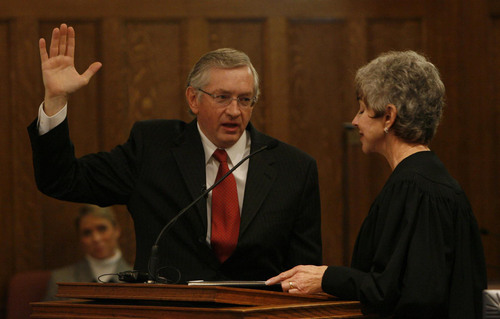This is an archived article that was published on sltrib.com in 2013, and information in the article may be outdated. It is provided only for personal research purposes and may not be reprinted.
• So is polygamy legal? As defined as three or more people living together and one or more "spiritual" marriages existing among that group, yes. Bigamy remains a third-degree felony punishable by up to five years in prison, but U.S. District Judge Clark Waddoups' ruling limited bigamy to someone having multiple active marriage licenses.
• In a nutshell, what did the judge say? He said the state could show no public interest in broad language that lumps cohabitation into the category of bigamy and the law was applied unevenly over the decades. Utah used it to prosecute people subscribing to early Mormon teachings and who were public about it rather than investigating anyone it suspected of breaking the statute. This, Waddoups said, amounted to violations of the First and 14th amendments.
• What about marriages to underage girls? The ruling discussed child abuse only to say there were no such allegations against the Browns, from the TLC show "Sister Wives." So all the statutes governing sex between adults and minors stand.
• Will the members of the mainstream Mormon church practice polygamy now? Almost certainly not. The LDS Church has a policy of excommunicating members who practice polygamy. A law professor who is a Mormon spoke with The Tribune on Saturday and said he saw nothing changing for the church or its members.
• Why did the "Sister Wives" family sue anyway? A 2010 investigation by Lehi police and the Utah County Attorney's Office into whether the Browns were violating the bigamy statute helped give the Browns standing to file their lawsuit. While no charges were filed, the Browns argued their family — husband Kody and wives Meri, Janelle, Christin and Robyn and their 17 children — were living under threat of prosecution. (The federal lawsuit is titled "Brown v. Buhman" for Utah County Attorney Jeff Buhman.) The state contended the Browns had no standing to file a lawsuit so long as no criminal charges were filed, but lost that argument.
• What about the claims polygamy is harmful to women and children? This was a big part of the state's argument, but Waddoups didn't buy it. He said the state presented no evidence of a correlation between polygamy and such crimes as child abuse, domestic abuse and failure to pay child support.
• What impact did this year's gay marriage rulings have? It appears none. Neither of the U.S. Supreme Court cases received citations in Waddoups' ruling. Waddoups did cite the 2003 case of Lawrence v. Texas that struck down sodomy laws for gay sex, quoting a passage affirming a right to freedom from "unwarranted government intrusions into a dwelling or other private places."
• What about other states? Waddoups' ruling was specific to Utah, which is said to have unusually broad language defining bigamy. Arizona, which has thousands of polygamists, does not have the cohabitation clause. The Texas bigamy statute has some language about living with a woman other than your wife. Even if another state had Utah's language, the ruling doesn't impact it yet.
• Will Utah appeal? Probably. Generally, the state doesn't like it when a judge strikes down a law. More specifically, Utah has invested a lot of resources over the decades to defending its bigamy statutes and a lot of people believe the statute is morally correct. Waddoups was probably aware an appeal was likely and that's why he took almost 11 months to write a 91-page opinion. Even if you don't like his opinion, Waddoups did you a favor there. The appeals courts will know well how Waddoups reached his decision and won't have to rehash facts or background of the case.
Twitter: @natecarlisle





